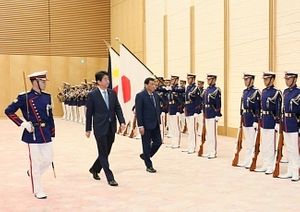Last week, the Philippine government disclosed that Japan had donated new heavy equipment for the ongoing relief effort in the southern Philippine city of Marawi which fell victim to a siege by Islamic State-linked rebels last year. The development was just the latest sign of Tokyo’s important and growing role as a key strategic partner for the Philippines despite the challenges encountered for ties under the leadership of President Rodrigo Duterte.
As I have noted before, though relations between Japan and the Philippines date back decades, the strengthening of ties over the past few years is nonetheless significant because it has occurred despite initial concerns about Duterte and bilateral ties. Tokyo has continued to boost relations with Manila because of its significance on its own terms as well as part of its wider effort to boost ties with Southeast Asian states (See: “ASEAN’s Role in Japan’s Indo-Pacific Strategy”).
That pattern has continued in 2018, and it extends to assistance of various forms that Japan is providing to the Philippine government. To take just one example, in January, the Japanese government gave the Philippine police another batch of patrol vehicles under the so-called Economic and Social Development Program on Counterterrorism and Public Security – which includes funding from Japanese official development assistance (ODA) on various fronts from the reconstruction of Marawi City to the provision of coastal monitoring radar equipment.
Last week we saw yet another example of this when the Japanese government turned over new heavy equipment to the Department of Public Works and Highways (DPWH) for use in the Philippine government’s rehabilitation and reconstruction program of Marawi City. That effort is significant not only for the welfare of the people and the country’s economic development, but also for its security (See: “ASEAN’s Post-Marawi Islamic State Challenge”). The assistance came in the form of a grant that was publicly described as being part of the Philippine-Japan Economic and Social Development Program on Counterterrorism and Public Security.
The equipment included seven hydraulic excavators, three bulldozers, three wheel loaders, two motor grades, and 12 dump trucks. The equipment was delivered in a handover ceremony attended by several Japanese and Philippine officials including Japanese Ambassador to the Philippines Koji Haneda and DPWH Secretary and Vice Chairman of the Task Force Bangon Marawi Mark Villar.
Apart from the construction machinery, DPWH also noted other forms of ongoing Japanese assistance as well, including Mitsubishi patrol vehicles, a grant for the United Nations Habitat program, and funding and technological assistance for the implementation of some of Duterte’s infrastructure projects under the so-called “Build Build Build” program. These examples are further testament to Japan’s importance as a partner for the Philippines.






























